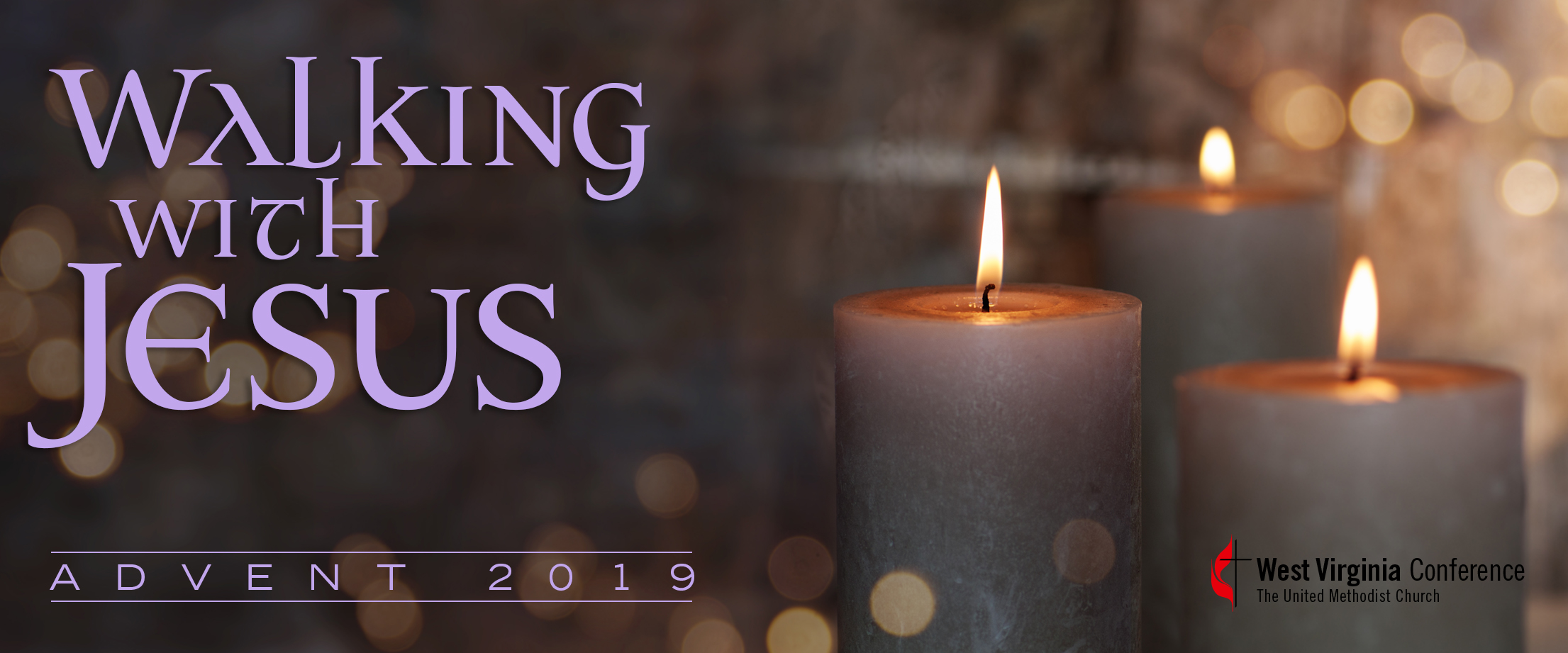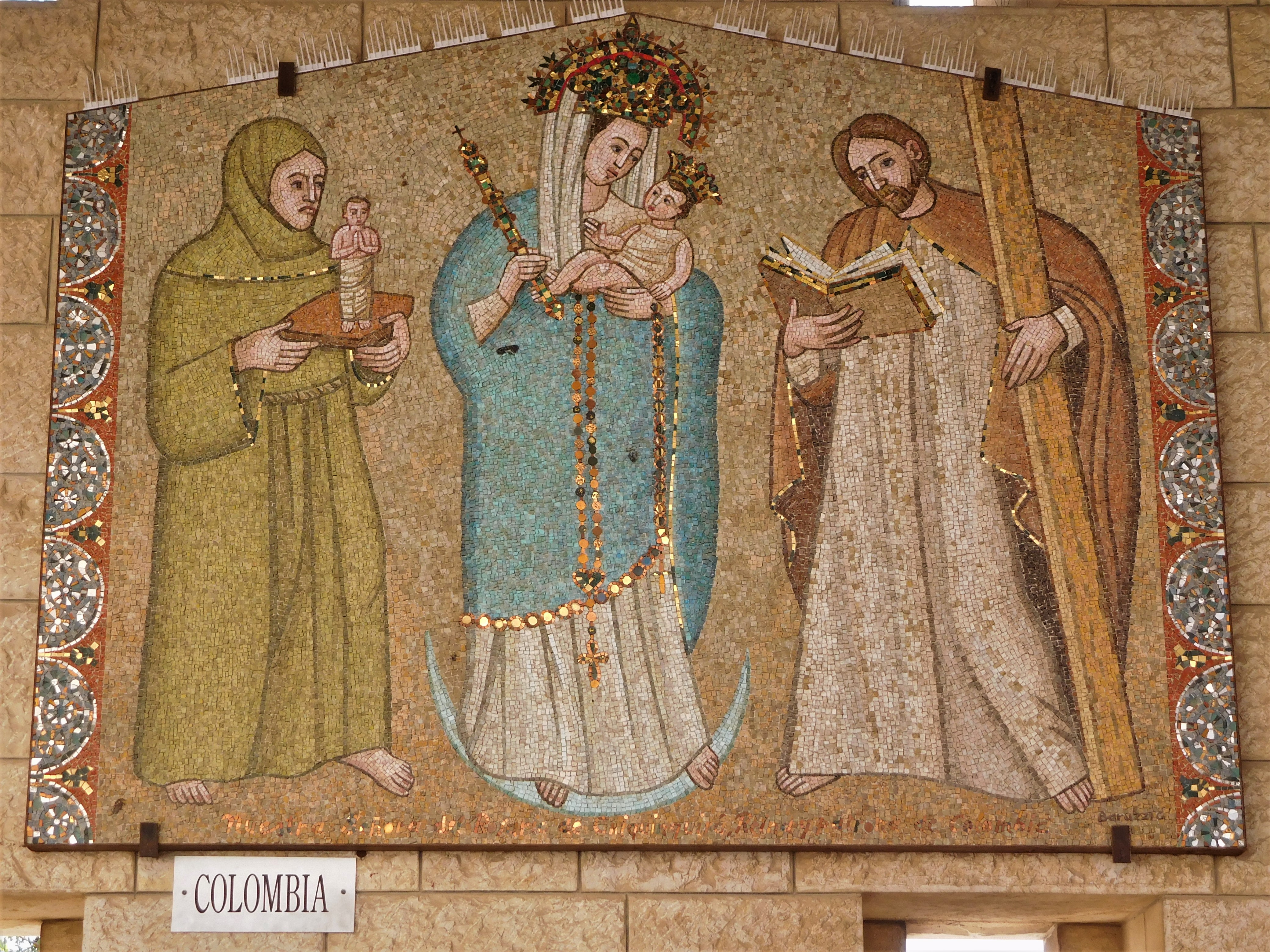
This week our Advent journey continues with a promise to a poor carpenter named Joseph, who was of the line of David, and the extraordinary story of a Hebrew girl who said yes to God.
The texts for the fourth Sunday of Advent are: Isaiah 7:10-16, Psalm 80:1-7, 17-19, Romans 1:1-7, Matthew 1:18-25.
Follow this link for Advent Worship Resources written by Bishop Sandra Steiner Ball.
Rev. JF Lacaria
Crosslanes UMC
Midland South District
In the seventh chapter of the book which carries his name, the prophet Isaiah gives Ahaz, King of Judah, a sign to give him courage in the face of mortal danger and the potential destruction of the City of David. The sign is a child whose name is hope – God is with us – Immanuel. In the book of Isaiah, this is the first mention of Immanuel whom we know as Jesus on this side of the manger and the Christ on this side of the cross.
As I read the text, I can only imagine what this setting looked like in the time of Isaiah’s assurance to King Ahaz. I know what this setting looks like now. The City of David is a modern sprawling city with tall buildings replacing high hills to form the horizon.

Places that are particularly significant to Christians are identified now by towers and spires, not hilltops, outcrops and valleys. The one constant is the fact that Jerusalem is up, higher than everything that surrounds it. From Bethlehem, where Immanuel appears as baby Jesus, you can turn toward Jerusalem and see its buildings forming the limit of your sight.
All the images stored in my memory, from household creches, to Sunday School manger scenes, to great works of art do not present the baby Jesus lying in a manger in front of a cityscape. If Jesus were to return to his birth-site now he would have to enter a church built on top of an older church located on a shrine, then go down a flight of stairs and elbow past a crowd, to reach an star inlaid in the rock that marks the spot - maybe.
I believe this description of Jerusalem, Bethlehem and the barn or cave of Immanuel’s birth is reflective of the crazy setting that faced King Ahaz. His kingdom was nothing like what he had imagined. The idea that hope was going to appear as a young pregnant woman and arrive as a baby son was preposterous. How long did Isaiah think the people had before the fighting began? Was everyone just going to wait for this kid to grow up? What kind of crazy warrior would he be? Isaiah had already warned everyone to not trust in anything that Judah had accomplished through construction, trade, wealth, self-righteousness. Trust the woman, trust the baby, things will be accomplished as soon as the kid knows right from wrong.
This whole Advent thing is experiencing and believing what is not real to us. We celebrate a birth that happened yesterday while we anticipate a birth that is coming tomorrow. Advent is located between what was and what is yet to be. We declare that all the creation longs for the Prince of Peace, but we arm ourselves and our nations just in case. Our actions do not reflect our hearts.
Charles Wesley captured this dislocation in a hymn text:
Come, thou long-expected Jesus, born to set thy people free;
from our fears and sins release us, let us find our rest in thee.
Israel’s strength and consolation, hope of all the earth thou art;
dear desire of every nation, joy of every longing heart.
Born thy people to deliver, born a child and yet a King,
born to reign in us forever, now thy gracious kingdom bring.
By thine own eternal spirit, rule in all our hearts alone;
by thine all sufficient merit, raise us to thy glorious throne.
May we all find our rest in Israel’s strength and consolation, the earth’s hope, this child who is yet a King.
Rev. David Johnston
Concord UMC
and Vine & Branches Campus Ministry
Southern District
About five hundred people lived in Nazareth at the time of Jesus Christ’s birth. Today it’s a good-sized city of around 77,000 people. As our tour group walked through the city up to the Church of the Annunciation, built over Mary’s home, it was hard to imagine the Nazareth that Joseph, Mary, and Jesus called home.
It is there in a small town of 500 people that Joseph learns that his fiancée Mary is expecting a child. Joseph has not yet been with Mary, and we can imagine that the claim that her pregnancy is the result of the Holy Spirit was difficult for him to believe. How many of us would believe a 15 or 16-year-old telling us that an angel had appeared to her and she was now pregnant by divine intervention?
Mary is the first to walk with Jesus, nurtured in her womb. She has the benefit of an angel who announced to her what is about to take place. Her “Yes!” to God is exemplary for us all. Joseph is the first person in the gospel of Matthew who must received the announcement second hand. It is not surprising his reaction is to try to quickly break off his engagement and go about his life. How could he believe such a tale and endure the shame of raising a child who is not his own in a town of 500 people?
Once Joseph has resolved to break off his engagement, he has a dream in which an angel comes to him. “Joseph, Son of David, do not be afraid to take Mary as your wife” (Matthew 1:20).
“Do not be afraid” is one of the most common phrases found in all of the Scriptures. We hear it on the lips of angels when they appear. We hear it from our Lord Jesus Christ when he appears to his disciples. When God is about to do something new and transformative, something outside of what we want or can even imagine, our typical human response is fear. Fear is natural and part of how we are made. Fear has its place in keeping us safe. But in the life of discipleship, fear typically drives out our faith and trust in God. God is our sure salvation. No one and nothing can separate us from the love of God revealed in Jesus Christ. So, as David the Psalmist asks, “The Lord is my light and my salvation- whom shall I fear? The Lord is the stronghold of my life; of whom shall I be afraid?” (Psalm 27:1).
Joseph responds to the news of Mary’s miraculous pregnancy with fear, yet God gives Joseph the grace he needs to walk with Jesus. “Do not be afraid to take Mary as your wife.” Do not fear the shame. Do not fear the ridicule. Do not fear the snickers and insults from your small town of five hundred people. Do not fear the thousands of bad scenarios that you can imagine. Why? “For the child the child conceived in her is from the Holy Spirit. She will bear a son, and you are to name him Jesus, for he will save his people from their sins” (Matthew 1:20-21).

Whom, then, shall Joseph fear? Of whom shall he be afraid? This child is humanity’s salvation, Joseph’s salvation. This child is God with us, God with Joseph. So when Joseph awoke, “he did as the angel of the Lord commanded him; he took her as his wife” (Matthew 1:24).
Joseph chooses faith over fear. He chooses trust and obedience to God over the easy way. He chooses to follow Jesus, even if that means shame and ridicule. Because what is shame and ridicule in the face of the eternal joy of knowing Christ?
During Advent, we prepare to receive Jesus Christ. Not just as a new born baby in the manger, but we also prepare to receive Christ in his return in final victory at the end of the age. It is a pregnant time. A time of waiting.
Advent is a season of walking with Jesus as Joseph does in our story. Joseph walks with Jesus Christ as he walks with Mary, pregnant with the coming Christ. It is a walking by faith, not by sight, for Jesus is hidden within Mary. His presence in her womb is ambiguous to the people of Nazareth and the world. Is this child who Mary claims he is or is this a ruse? Joseph’s presence by her is also ambiguous. Is this man righteously following God or is he a fool?
Our walking with Jesus in Advent resonates with the Holy Family. We walk with Jesus through creation groaning as in labor pains for the return of Christ. It is a walking by faith, not by sight, for at times it is difficult to see the presence of the Risen Christ.
Like Joseph, our walking with Jesus, expecting his return, is ambiguous. Are we righteously following God or are we fools? Perhaps we are a bit of both, for following Jesus will always seem foolish to the world. Yet we choose faith over fear. We choose trust and obedience to God and the way of the cross over the easy way. We choose to follow Jesus—who was, and is, and is to come—even if that means shame and ridicule from the people we know. Because what is shame and ridicule in the face of the eternal joy of knowing Christ? Even when we are gripped by fear, God will give us the grace we need to follow after Jesus.